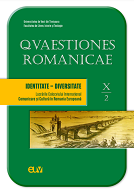Diversità e creatività: l’onomastica diabolica nelle traduzioni romene della Divina commedia
Diversity and Creativity: the Onomastics of Devils in the Romanian Translations of the Divine Comedy
Author(s): Corina AntonSubject(s): Romanian Literature, Translation Studies, Italian literature, Sociology of Literature
Published by: Universitatea de Vest din Timişoara
Keywords: Dante; Inferno; Romanian translations; devils’ names;
Summary/Abstract: This article examines the Romanian names of the devils in different translations of the Divine Comedy. I analyse the solutions adopted by the authors of complete translations of Dante’s Inferno, both in verse or prose: Maria Chițiu (1883), Nicolae Gane (1906), George Coșbuc (1925), Alexandru Marcu (1932), Ion A. Țundrea (1945), Eta Boeriu (1965), George Buznea (1975), Giuseppe Cifarelli (1993), Răzvan Codrescu (2006), Marian Papahagi (2012), Cristian Bădiliță (2021). Given the countless possible interpretations of the devils’ names (i.e., deformations of names of Florentine and Lucca families, names of popular inspiration, creative lexical combinations), translators inevitably made a choice in order to come up with an own and sole Romanian variant. To preserve the comic effect sought by Dante himself in the invention of the devils’ names, Romanian translators chose combined names or employed suffixes frequently found in the names of characters from local fairy tales and folklore. The richness and the diversity of the solutions adopted indicate a reasoned approach as well as a dynamic relationship with the source text, which may be set in relation with different timed receptions of the Divine Comedy in Romania.
Journal: Quaestiones Romanicae
- Issue Year: X/2023
- Issue No: 2
- Page Range: 126-134
- Page Count: 9
- Language: Italian

